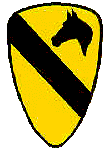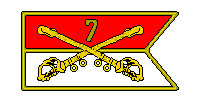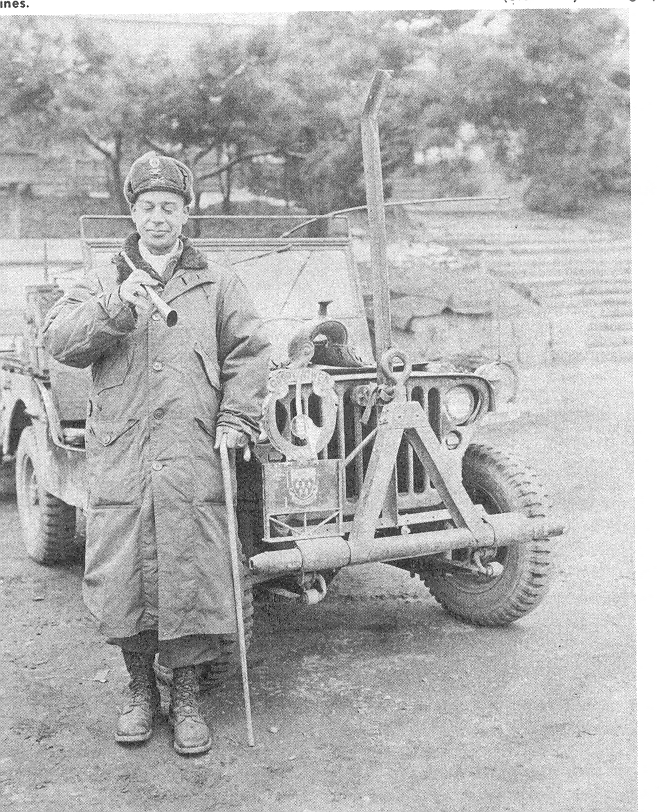ARRIVING IN KOREA
I flew from the United States as a military replacement for the 8th Army, first to Tokyo International airport, then by ship, landing at Inchon, South Korea, in the aftermath of Gen MacArthur’s historically successful Marine Corps landing there to cut off the North Korean Army from its rear. That was followed by the ‘Breakout’ of the Pusan Perimeter in the south by the 8th Army, led by Task Force Lynch – the 3d Battalion, 7th US Cavalry Regiment, which overran trapped North Korean units all the way to Seoul before crossing the 38th Parallel border between North and South and continuing on the historic ‘Invasion Route’ north from Seoul.
I was luckily assigned as a replacement officer to the famed 1st Cavalry Division, which then assigned me to the legendary 7th Cavalry – Custer’s old outfit – and the 7th Cav assigned me further to Company K, 3d Battalion, 7th Cav. Which, interestingly enough was the lead company, commanded by Captain John Flynn in the breakout, with the deepest 24 hour penetration into enemy territory in American military history – 114 miles.



As it turned out I could not have been assigned to a better US Army Division, US Army Regiment, Battalion, and Rifle Company for an inexperienced 2d Lieutenant who never had the chance even to go through the Basic Infantry Officers Course – which was routine for all Infantry-Branch 2d Lieutenants prior to, and after, the Class of ’50 - before I was plunged into combat.
I had to catch up with the Cav Division from Inchon, for the entire 8th Army had pushed north past the 38th parallel border very rapidly after the backbone of the North Korean Army was broken. It was at the Yalu River 200 miles north by the end of November. I had Thanksgiving dinner at a Replacement Company in Pyongyang, the Capital of North Korea which had been overrun by the 1st Cav.
I then caught up with the 7th Cav near Kuna-Ri just as it had stopped, encamped, and been put into 8th Army Reserve for a breather while the 8th and 5th Cav Regiments pushed patrols onto the actual Yalu River’s edge that marked the border between North Korea and China.
My first exposure to the actual fighting soldiers and officers of the 7th Cav came after daylight after we offloaded from a 2 ½ ton truck in the dark and slept in a large windy tent with several other replacement officers. We would be taken to our company units the next day. It was cold, but not severely – yet. I had my issue down-filled sleeping bag which I had been warned not to get wet by the supply sergeant who handed it to me back at the Replacement company in Pyongyang, lest it would lose its ability to retain body warmth.
That was one of the most important pieces of Army equipment ever issued for the Korean War. In fact a retired Infantry Chinese Colonel who fought against our 1st Cavalry Division, said 50 years later to me – translated by my Chinese daughter in law “You had better sleeping bags than we did.” True. For the entire American 8th Army was about to experience one of the severest Korean Peninsula winters on record.
The Garry Owen
While waiting for the administrative staff to take us to our assigned companies that November 26th, 1950, I was able to stand by and watch a pretty large 7th Cav Regimental Review and Awards Ceremony, with a Color Guard out in front of the ranks of the men who were to be decorated. Col Billy Harris, the 7th Cav Regimental Commander drove up in his jeep which had a western horse saddle across the hood. And a big metal 7th Cav emblem on the front bumper. Col Harris, shorter than most of the men, wore a very long insulated and lined overcoat that came all the way down to his boot tops. He wore a Pile Cap with, with his colonel’s rank eagle insignia on its front. He had a cane.
|
|
| Col Billy Harris - note the saddle on the jeep hood |
Colonel William 'Billy' Harris, Commander of the 7th Cav Regiment in Korea
Before he went out to accompany Gen Gay making the awards he held up, for a photographer, a captured Korean or Chinese horn that I learned soon enough, was blown by the enemy during attacks.
The 1st Cav Division Commander Major General G Gay was driven up next, for he would actually pin the awards on the soldier’s uniforms.
This was a rare formal ceremony in the field in the midst of a war, with all who attended armed and in their battle dress. I learned it was the first chance commander Col Billy Harris had to address his troops since the 7th Cav landed in Korea July 22d, four months before, before bitterly defending the Pusan Perimeter, and then attacking north the entire 400 mile length of the Korean Peninsula.
Harris made a stirring speech recounting the accomplishments of the 7th Cav, and paid tribute to those killed in action.
And while the Adjutant read off the citations, General Gay pinned Silver Stars on the field jackets of a number of the troopers, and Bronze Stars with V/Device (for Valor) on others. Then Chaplain Griepp read the 23d Psalm, a bugler sounded Taps, and another chaplain read off the names of the dead soldiers who were receiving posthumous awards for their bravery.
The men were not turned out with polished boots or particularly clean and pressed field jackets or pants – they were combat soldiers right off the line – which they would go back to as soon as the ceremony was over. They had their Steel Helmets on, some had 1st Cavalry patches on their jackets, some were in brown leather combat boots, others wore something strange to me, insulated ‘shoe-pac’ boots.
Watching that ceremony and listening to those citations for combat awards for what those men, living and dead were being cited for, I got an unexpected introduction into the ‘Garry Owen’ – the motto, the song, the name and reputation – most associated with the 7th United States Cavalry. It was not an ‘elite’ unit, and in fact was a boots on the ground, not horse, cavalry unit which it was throughout WWII. But General McArthur chose the 7th Cavalry to parade down Tokyo's main avenue after the Japanese surrender. By the Vietnam War it was 'air'cavalry. But it had pride based on its military history – which is what I knew was a valuable asset for men’s morale in war. It was exactly the kind of unit I wanted to be part of, and if I made it, to command in it at a higher level that Rifle Platoon.
Next Korea(2)
